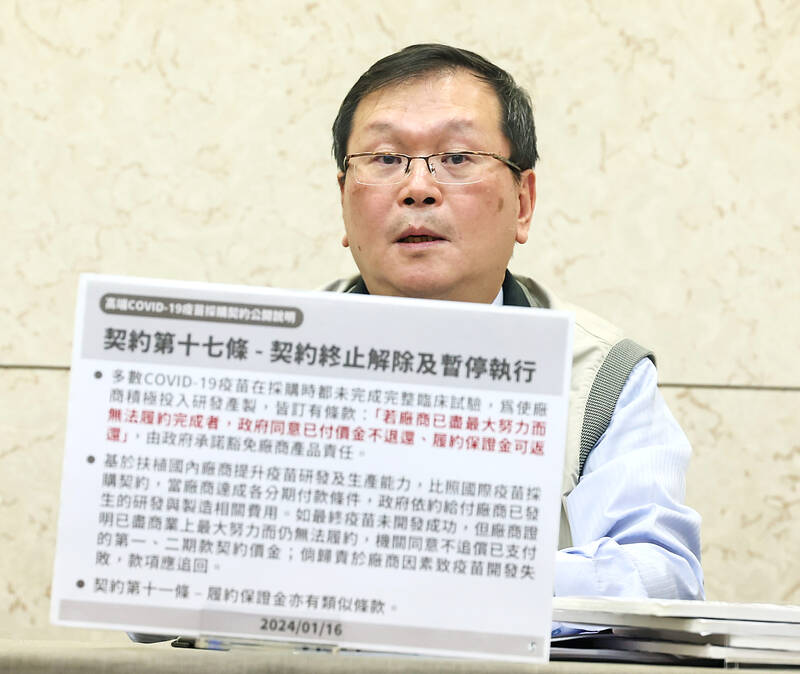The Centers for Disease Control (CDC) yesterday published its COVID-19 vaccine procurement contract with Taiwan-based Medigen Vaccine Biologics Corp (高端疫苗) after the company’s board of directors agreed to an early disclosure of the agreement.
The Chinese Nationalist Party (KMT) had repeatedly asked the CDC to publish the contract, saying the government might be concealing secrets from the public.
Premier Chen Chien-jen (陳建仁) last week said the government could not unilaterally disclose the contract due to a confidentiality agreement, but that it was negotiating with Medigen in hopes that it would agree to an early disclosure.

Photo: CNA
At an impromptu news conference yesterday afternoon, CDC Director-General Chuang Jen-hsiang (莊人祥) said Medigen informed the agency at 3:30pm yesterday that its board of directors had agreed to let it publish the contract.
Chuang said the CDC and Medigen had signed a procurement contract and a confidentiality agreement, ensuring that both sides do not disclose the details of the contract, which is in line with international commercial practices, and that many governments have also signed confidentiality agreements when they signed procurement contracts with vaccine producers.
The procurement contract was signed on May 28, 2021, according to the Public Construction Commission’s procurement contract template, but it lacked a commercial confidentiality agreement, so both sides had an oral contract to adhere to non-disclosure obligations, he said.
Medigen on June 8, 2021, asked to sign a supplementary confidentiality agreement to prevent leaks of ingredients, which was signed on July 19, 2021, he added.
According to the confidentiality agreement with Medigen, the confidentiality period was set at five years after the date of signing, but to bolster the public’s confidence, both sides agreed to disclose the information earlier, he said.
There is no agreement to keep the contract “sealed for 30 years” as some politicians have claimed, he said.
Confidentiality agreements for vaccine procurement are not new, as the CDC also signed a seven-year confidentiality agreement with Novartis when it purchased the influenza A (H1N1) monovalent vaccine in 2009, and agreements with different confidentiality periods were signed with AstraZeneca, Pfizer-BioNTech, and Moderna for their COVID-19 vaccines, he said.
Regarding vaccine prices, he said that when the Central Epidemic Command Center (CECC) announced in November 2020 that it planned to spend NT$11.5 billion (US$366.34 million) to purchase 15 million doses — or about NT$700 per dose — it was an estimated price that did not include cold chain logistics and other costs.
During the bargaining process from February to May 2021, Medigen offered a quote of NT$950 per dose, and the CDC negotiated the price to NT$881 apiece for single-dose vials and NT$810 for multi-dose vials, Chuang said.
The company must also the distribute the vaccine to no fewer than 200 locations, and be responsible for the vaccines from inspection to shipping, and the cost of disposal and other operating fees, he said.
The company had previously disclosed the prices of the vaccine and now that the full contract has been published with the consent of both sides, there is no breach of contract and it would not affect the CDC’s credit in purchasing vaccines in future, he said.
The 58-page vaccine procurement contract has been published on the CDC’s official Web site.

The first global hotel Keys Selection by the Michelin Guide includes four hotels in Taiwan, Michelin announced yesterday. All four received the “Michelin One Key,” indicating guests are to experience a “very special stay” at any of the locations as the establishments are “a true gem with personality. Service always goes the extra mile, and the hotel provides much more than others in its price range.” Of the four hotels, three are located in Taipei and one in Taichung. In Taipei, the One Key accolades were awarded to the Capella Taipei, Kimpton Da An Taipei and Mandarin Oriental Taipei. Capella Taipei was described by

EVA Airways today confirmed the death of a flight attendant on Saturday upon their return to Taiwan and said an internal investigation has been launched, as criticism mounted over a social media post accusing the airline of failing to offer sufficient employee protections. According to the post, the flight attendant complained of feeling sick on board a flight, but was unable to take sick leave or access medical care. The crew member allegedly did not receive assistance from the chief purser, who failed to heed their requests for medical attention or call an ambulance once the flight landed, the post said. As sick

Minister of Economic Affairs Kung Ming-hsin (龔明鑫) yesterday said that private-sector refiners are willing to stop buying Russian naphtha should the EU ask them to, after a group of non-governmental organizations, including the Centre for Research on Energy and Clean Air (CREA), criticized the nation’s continued business with the country. While Taiwan joined the US and its Western allies in putting broad sanctions on Russia after it invaded Ukraine in 2022, it did not explicitly ban imports of naphtha, a major hard-currency earner for Russia. While state-owned firms stopped importing Russian oil in 2023, there is no restriction on private companies to

INDUSTRY: Beijing’s latest export measures go beyond targeting the US and would likely affect any country that uses Chinese rare earths or related tech, an academic said Taiwanese industries could face significant disruption from China’s newly tightened export controls on rare earth elements, as much of Taiwan’s supply indirectly depends on Chinese materials processed in Japan, a local expert said yesterday. Kristy Hsu (徐遵慈), director of the Taiwan ASEAN Studies Center at the Chung-Hua Institution for Economic Research, said that China’s latest export measures go far beyond targeting the US and would likely affect any country that uses Chinese rare earths or related technologies. With Japan and Southeast Asian countries among those expected to be hit, Taiwan could feel the impact through its reliance on Japanese-made semi-finished products and